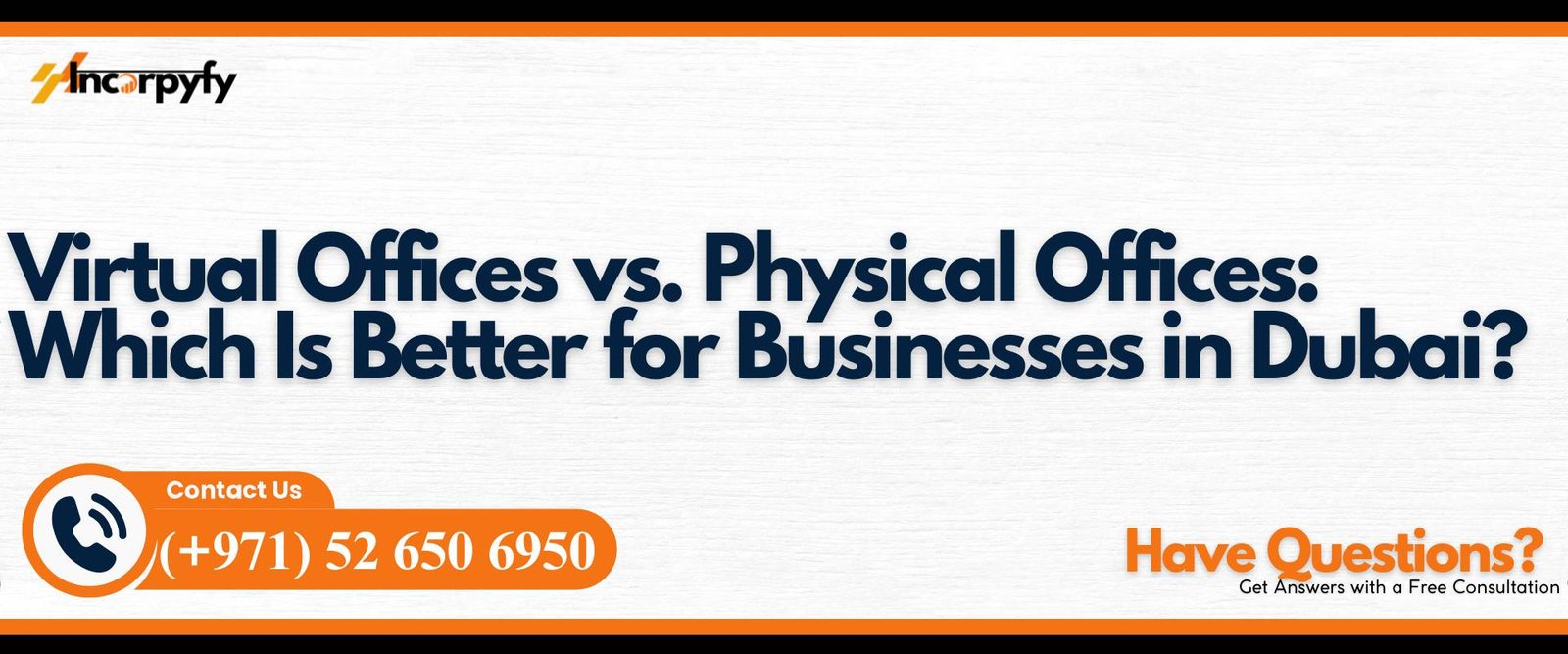
In a city as fast-growing and future-forward as Dubai, the way we do business is constantly evolving. One big decision entrepreneurs face today is whether to go with a virtual office or a physical office. This choice isn’t just about space—it’s about strategy, growth, and making the most of your investment.
Whether you’re launching a startup, expanding from India, or opening a new branch, the location and type of office can impact your image, budget, and even your Dubai business license eligibility.
Let’s break down the pros and cons of both options so you can make a smart choice for your business in the UAE.
Understanding Virtual Offices in Dubai
A virtual office in Dubai gives you a legal business address without the need for physical space. It’s perfect for startups, freelancers, or digital businesses looking for flexibility, low overhead, and a quick setup. You can still receive mail, access meeting rooms, and apply for trade licenses in many Free Zones.
What Is a Virtual Office in Dubai?
A virtual office in Dubai lets you run your business without a traditional workspace. You get a professional business address, mail handling, and sometimes access to meeting rooms. But you don’t need to be physically present every day.
This model suits freelancers, consultants, and digital businesses that operate online.
Key Benefits of Virtual Offices
- Cost-effective for startups
- Flexible working hours
- Low commitment setup
- No commute or operational stress
- Still allows you to get a Dubai trade license in many Free Zones
Limitations of Virtual Offices
While it saves money and supports remote work, a virtual office in Dubai might not offer the same sense of permanence or face-to-face collaboration as a physical office does.
Understanding Physical Offices in Dubai
A physical office in Dubai provides a permanent workspace for your team and clients. It supports in-person collaboration, builds stronger business identity, and is often required for certain license types. This option is ideal for larger teams or businesses in sectors like healthcare, finance, law, and product-based services.
What Is a Physical Office in Dubai?
A physical office is a traditional setup—a rented or owned space where your team comes to work regularly. These are often located in key business areas like Business Bay, Downtown Dubai, or Free Zones such as DMCC.
Advantages of Physical Offices
- Stronger brand presence
- Better team collaboration
- Trusted client interactions
- Some license types require it
- Ideal for mainland business setup in Dubai
Challenges of Physical Offices
- High upfront and maintenance costs
- Longer lease contracts
- Utility, internet, and fit-out expenses
- Less flexibility for small or remote teams
Business Setup in Dubai: Do You Really Need a Physical Office?
This is where many new business owners get confused. Do you really need to rent an office space?
Not always.
Many Dubai Free Zones—especially IFZA, Meydan, and Shams—allow you to start your company using a virtual office or flexi-desk. You can register your business, open a bank account, and even get visas without renting a full office.
But for activities like legal services, clinics, manufacturing, or logistics, a physical location in Dubai may be mandatory.
Virtual Offices vs. Physical Offices: Cost Comparison in Dubai
Virtual offices in Dubai offer major cost savings—low rent, no utility bills, and minimal maintenance. Physical offices, while offering presence and professionalism, come with higher expenses like rent, fit-outs, DEWA bills, and longer commitments. Your decision should align with your business model and current financial flexibility.
Initial Setup Cost
- Virtual Office in Dubai: Starting from AED 4,000 to AED 8,000 annually
- Physical Office: Starting from AED 30,000 to AED 150,000 annually, depending on size and location
Hidden Costs to Consider
For physical offices in Dubai, you’ll need to account for:
- Office fit-out
- Furniture and equipment
- DEWA (electricity and water)
- Internet and telecom
- Ejari registration
- Cleaning, reception, and pantry services
Virtual offices, on the other hand, usually include all services in one fixed price.
Licensing and Legal Requirements
Your office setup can affect your license approval. Many Free Zones allow virtual office licenses, especially for consultants, e-commerce, or digital startups. However, physical offices are mandatory for some regulated activities like trading, logistics, and clinics. Always check with your Free Zone or consultant before proceeding.
Does Your License Type Dictate the Office Type?
Absolutely. Some business activities under the Dubai business license may require a physical office (like clinics or trading firms). Others like IT consultancy, marketing, or e-commerce can function fully with a virtual office setup in Dubai.
Before choosing, always check with your business setup consultant in Dubai about which type of license is best for your needs.
Choosing Between Virtual and Physical Office Based on Business Type
Business type plays a key role in your office decision. Remote-friendly services like tech, design, or digital marketing thrive with virtual offices. In contrast, client-facing sectors such as legal, health, or real estate often require a physical space in Dubai for credibility and operational efficiency.
Virtual Office is Ideal For:
- Freelancers and solo consultants
- E-commerce businesses and dropshippers
- Software companies and IT startups
- Remote-first teams
- Business testing new markets
Physical Office is Ideal For:
- Law firms, audit companies, and finance services
- Healthcare and wellness clinics
- Logistics companies with inventory
- Retail or showroom-based businesses
- Teams with frequent client visits or in-house staff
Dubai Free Zones Offering Virtual Office Options
Many Free Zones offer virtual office packages with flexibility and low costs. These include:
IFZA Free Zone
Known for fast business setup and virtual desk license options. Great for consultants and tech startups.
Meydan Free Zone
Popular among digital entrepreneurs. Offers flexible license packages with minimal paperwork.
Shams Free Zone
Ideal for media and creative businesses. Low-cost packages and access to shared workspaces.
RAKEZ
Technically in Ras Al Khaimah but serves Dubai-based businesses too. Flexi-desk offices with scalable solutions.
Brand Image and Client Perception
Having a physical office in Dubai boosts your brand’s trust and shows commitment to clients. A prime business address makes your company appear established. Still, virtual offices in reputable buildings can also enhance your image, especially when you’re balancing professionalism with cost-effective operations.
Physical Office Shows Stability
Clients may trust your business more if they can visit your office. A prestigious location like Sheikh Zayed Road adds status and signals long-term commitment.
Virtual Office Still Projects Professionalism
Many virtual office addresses in Dubai are in high-end buildings. You still get the credibility without the overhead.
Working Culture and Productivity
Physical offices foster real-time communication and help build team culture. They’re great for group brainstorming and hands-on roles. Virtual offices, on the other hand, support remote work and flexible schedules, which can boost productivity for digital teams or startups managing global operations from Dubai.
Collaboration in Physical Offices
Physical offices foster creativity, communication, and culture. They work best for teams that rely on live interaction and idea sharing.
Flexibility in Virtual Offices
With a virtual office in Dubai, teams can work from anywhere. You save money on transport, utilities, and get access to global talent.
Scalability and Growth Plans
Starting lean is smart. Many businesses begin with a virtual office, and when the team grows or client demand increases, they upgrade to a physical space.
This strategy reduces risk and helps manage cash flow in early stages.
Conclusion
There’s no one-size-fits-all answer. The better choice depends on what your business does, your growth plans, and how you want to operate.
If you’re just starting out, testing a new idea, or operating online—virtual offices in Dubai are perfect. They keep your costs low and let you stay flexible.
If you’re building a team, welcoming clients, or need face-to-face trust—physical offices in Dubai may be worth the investment.
Talk to a business setup expert before you decide. The right workspace can set the tone for your entire business journey.
FAQs
Is a virtual office legal for getting a business license in Dubai?
Yes, many Free Zones allow business setup using a virtual office address.
Can I apply for visas with a virtual office?
Yes, but it depends on the Free Zone. Some allow visa allocation with flexi-desks.
How much does a virtual office cost in Dubai?
On average, between AED 4,000 to AED 8,000 per year.
What are the cheapest Free Zones for virtual offices?
IFZA and Meydan are among the most affordable options.
Can I upgrade from virtual to physical office later?
Yes, most Free Zones allow you to upgrade or relocate easily.
Is Ejari required for virtual offices?
No. Ejari registration is only required for mainland physical offices.
Can I open a bank account with a virtual office?
Yes, if your Free Zone license is valid and meets the bank’s KYC requirements.
Which businesses must have a physical office?
Healthcare, real estate, logistics, and some trading businesses usually need physical space.
Do clients take virtual offices seriously?
Yes, especially if your address is in a recognized building. But face-to-face industries may still prefer physical locations.
Which is more scalable—virtual or physical?
Virtual offices are more scalable in early stages. You can grow into a physical office once you validate your business model.






